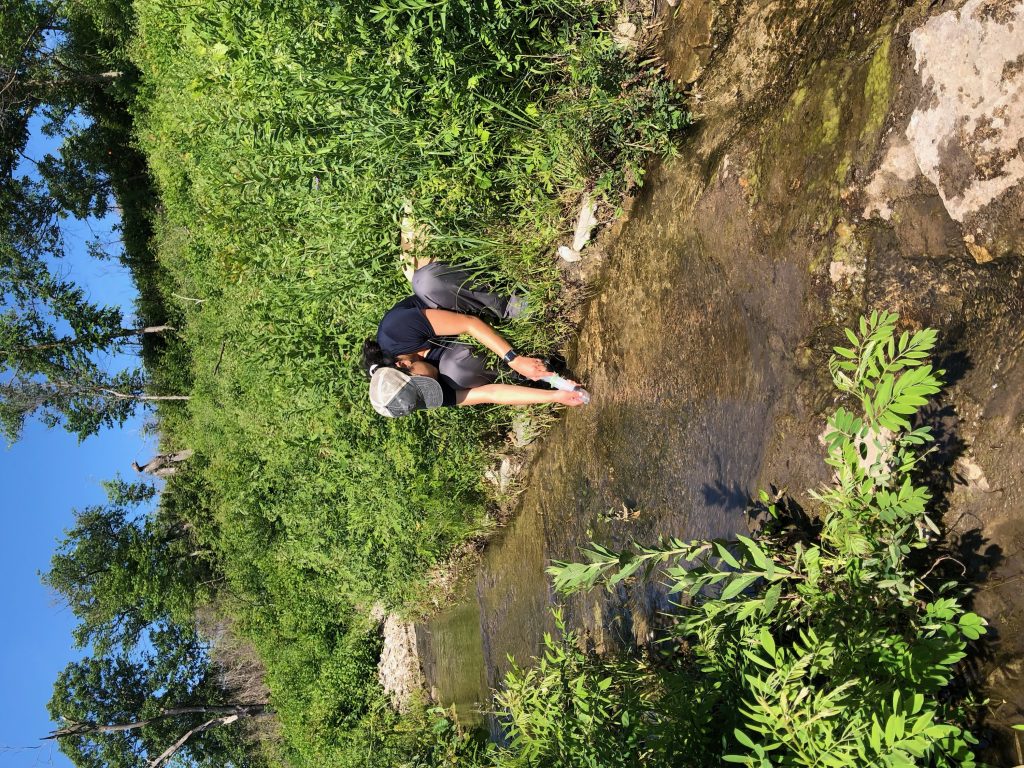

(Left) Jacquelyn Martinez presenting her research at the National NSF EPSCoR conference in Columbia, SC., and (Right) Jacquelyn collecting water samples for her research project.
Jacquelyn Martinez always felt drawn to biochemistry. She said this was “mostly because I enjoyed my biology courses, and I was always entranced by the sophistication and yet simplicity of the function of our world. When I added chemistry courses to my studies, I believe I created a greater understanding of how the world functions at a molecular level.” Last summer, Jacquelyn followed her interest in biochemistry and participated in the Pathways to STEM: Kansas Louis Stokes Alliance for Minority Participation (KS-LSAMP) at Kansas State University (KSU). The KS-LSAMP program is funded by the National Science Foundation and “promotes recruitment and retention programs throughout Kansas in support of increasing the success of underrepresented minority students in science, technology, engineering and math (STEM) fields.” The summer portion of KS-LSAMP is called Research Immersion: Pathways to STEM (RiPS) and is an 8-week summer research program that “aims to introduce students to the process of research and assist in their academic and professional success.” Kansas NSF EPSCoR RII Track-1 Award OIA-1656006: Microbiomes of Aquatic, Plant, and Soil Systems across Kansas (MAPS) has partnered with the KSU KS-LSAMP program as part of the MAPS education and outreach initiatives by providing mentors to work with participants as they create their independent research projects. Jacquelyn studied with Dr. Walter Dodds, University Distinguished Professor of Biology at KSU and MAPS Co-PI overseeing the aquatics research.
The title of Jacquelyn’s research project is Effects of Flooding on the Patterns of Nutrient Concentrations of Prairie Streams. She described her project as follows, “Over the summer I researched the streams of the Konza Prairie Biological Station in Manhattan, KS. My mentor was Dr.Walter Dodds, and I also worked with a graduate student from the Dodds Lab, James Guinnip. My research was a comparative analysis between stream samples taken immediately following the drought in 2018 and the samples taken during the 2019 streams’ flooded period. As I analyzed the samples, I discovered that nitrate levels either decreased or stayed the same. In addition, I found that the nitrate levels continued to be relatively constant as the water flowed downstream, the dissolved organic carbon decreased, and the ammonium (except for a few sites) increased. My analysis revealed that by assessing the nutrient dynamics at different hydrologic stages, we can identify factors controlling spatial patterns of nutrient concentrations and extrapolate it to biotic influences.” In the fall of 2019, Jacquelyn presented her research at the RiPS Summer Program Final Poster Session on July 24, 2019, and at the National NSF EPSCoR Conference poster session in Columbia, SC.
When asked about her summer research experience, Jacquelyn said, “the KS-LSAMP program provided me the opportunity to explore and participate in an area of study that I was not familiar with. In addition, I learned how to conduct field research. My favorite part of the KS-LSAMP experience was meeting the other students, staff, and faculty. I enjoyed hearing about their experiences and learning about how they developed their skills and knowledge to address the problems of the world. I am extremely grateful to the KS-LSAMP program for offering me the opportunity to begin my research career early and develop the skills necessary to succeed in my future endeavors.”
A native of Dodge City, KS, Jacquelyn is currently completing her sophomore year at Wichita State University in Wichita KS where she is pursuing a degree in Biochemistry. She is also actively involved with the Hispanic American Leadership Organization (HALO) and explained, “The purpose of HALO is to enhance the education, cultural, and social development of its members and the community. I believe this aligns with my values of increasing minority representation not only in STEM but in other areas as well.” When asked what her future plans might be she added, “my general interest in biochemistry compliments the requirements necessary to achieve my ultimate goal of attaining my M.D. and pursuing my interest in conducting research.”
Workforce Development, Education and Outreach funding for the KS-LSAMP program is provided by the Kansas NSF EPSCoR RII Track-1 Award OIA-1656006 titled: Microbiomes of Aquatic, Plant, and Soil Systems across Kansas. The grant’s workforce development and educational objectives are designed to enhance STEM education in Kansas by supporting activities that will lead to an expanded STEM workforce or prepare a new generation for STEM careers in the areas of aquatic, plant and soil microbiome environments and ecological systems.
